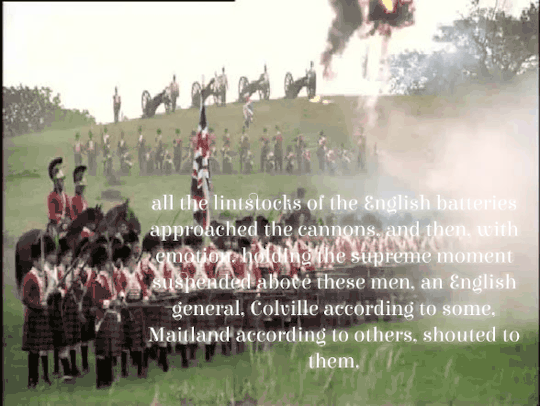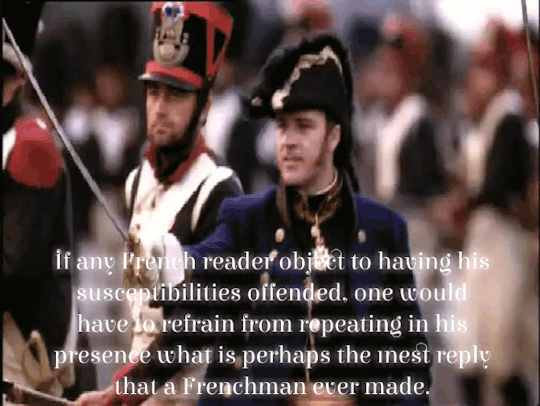Text
If your religion doesn’t make room for ants and beetles it’s bad
82 notes
·
View notes
Text
Looking through old newspapers, you will find many little reports on women's clubs/speakers series, usually just mentioning briefly who hosted and the general topic. And naturally, I have come across many (many many) mentions of clubs discussing Les Miserables, but usually no detail on the opinions discussed. But I found one example of a Miss Dussau of Adelaide, SA, who gave a series of speeches on French literature in 1899, including one on the life of Victor Hugo. Here's the report in the Adelaide Evening Journal:
She dwelt on the beauty of the great Frenchman's poetry, his sincerity, and the moral tone of his writings. They did not bear translation. "Les Miserables" was quite another thing in English. Miss Dussau said she was lamentably disappointed when she read the English translation.
and in the Express and Telegraph:
"Les Miserables," the author's most perfect work, the lecturer strongly urged could never be adequately appreciated through an English translation. She commended it specially to her hearers as in itself a worthy reward for the study of the French language to be able to grasp the realism and beauty of this powerful work in its original.
Dussau, a French woman (pictured here), was governess for the children of Hallam Tennyson, the then-governor of South Australia.
4 notes
·
View notes
Photo
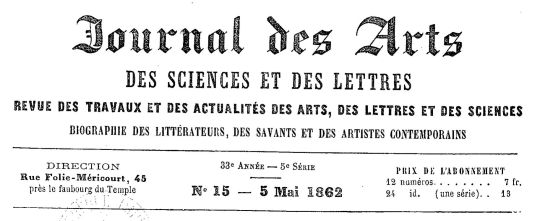
Les Misérables, 1st part, Fantine, by Victor Hugo, 2 volumes in-8º
This work, which is making a lot of noise, has been judged in numerous ways. Some accuse the author of wanting to rehabilitate the convict and the prostitute; others approve of this protest against the severity and merciless prejudice faced by those who have fallen. In any case, within it there is evangelical inspiration, a veritable love of humanity, and the noble movements of a generous heart.
If scrupulous minds are terrified by the sight of condemned beings, they are then gently moved by the kind face of the good prelate who carries out his duty less through the exact practices of worship, and more through acts of active benevolence towards those who are suffering. We enjoyed the features through which the character of this excellent priest is painted. So, when it came to a question of charity, he was not discouraged, not even in the face of refusal, and he then found words to make one think. One day he was collecting alms for the poor. He addressed an old noble who was rich but miserly.
“Monsieur le Marquis, you must give me something.”
“I have my own poor,” he responded in refusal.
“And well,” replied the charitable man, “give for your poor.” [What Myriel actually says is “Give me your poor.”]
Beautiful pages and beautiful scenes are not lacking in this work by M. Victor Hugo. As for style, the author is the same as ever: brilliant, bombastic, rich in expressions, but sometimes falling into pomposity, searching for too many opposites and too often lacking simplicity. There is much to find fault with, especially in the scenes with the students, which does not suit the poetic talents of M. Victor Hugo. He forgets himself when, for example, he makes one of those characters say:
“Let us complete our course of law by folly and eating! Indigestion and the digest. Let Justinian be the male, and Feasting, the female!” [pulling these quotes from Hapgood. I’m always interested when they criticize a specific sentence. What is it about these particular sentences that stood out?]
“You are fond of apple turnovers, ladies; do not indulge in them to excess. Even in the matter of turnovers, good sense and art are requisite.”
“This pun which has fallen from the skies must not be received with too much stupor. Everything which falls in that way is not necessarily worthy of enthusiasm and respect.”
“There was not a single spider’s web, not a grain of dust, on the glass window of that conscience.” [<--The others are all quotes from Tholomyes. This is from the narrator, about Simplice.]
“Long lashes put the hola on the brouhaha of the lower half of the face.” [This is not a citation, this is my translation of their very incorrect citation. Also it’s from the narrator, not from Tholomyes.]
One other thing about Les Misérables: M. Victor Hugo resumes his story but does not link them together; he disperses it [l'égaillé], makes it untidy [le débraillé] and scruffs it up [l'éraille]. It is M. Barbey d'Aurevilly who employed those three verbs ending in “aille” in the paper le Pays on the 17th of April [le Pays on April 19th].
Where did he make the discovery [trouvaille] of that indicative “égaille,” with which he derided [raille] M. Victor Hugo? We searched in vain. The critic is an original writer not only in the expression of his thoughts. A writer under the pseudonym “Stock,” in the last edition of le Constitutionnel, described his costume thusly: a red shirt with white cuffs rolled up the sleeves, a corseted redingote, gloves with many colored bands, and a jacket with a collar of black velvet and flesh-colored lining. [Marie-Lætitia Bonaparte-Wyse, contributed to le Constitutionnel through Sainte-Beuve, under the pen name "Baron de Stock." The article in question can be found here.]
Source: Journal des arts, des sciences et des lettres, 5 May 1862
#les miserables#contemporary reaction#my translation#my research#part 2#post I made a year ago before I knew more about the subject
1 note
·
View note
Text
On the double casting of Fredrick March as Valjean and Champmathieu:
My dear Fredric March:
The other night I was busily engaged with a juicy steak in a Hollywood restaurant, with one ear cocked on your fifteen minute radio interview (the proprietor had humbly asked if I'd mind!) It was a nice interview, but I was fifty percent absorbed in the steak until you mentioned your playing of a dual rôle in Les Miserables. Immediately I forgot the steak, the shoe string potatoes that went with it, and the strawberry pie that came after. Because --
Recently I came away from Les Miserables in transports over a superb piece of acting. Not your Jean Valjean, nor Laughton's Javert. I just took those for granted. It was the forlorn half wit, mistakenly arrested and brought to trial as Valjean -- the bewildered vagrant trying to prove the innocence he feels in his befuddled soul and brain. But I had got in too late to read the cast and could not even guess what magnificent actor, new to Hollywood, was making his début back of those whiskers!
What a characterization! The futile gestures, the goofy glint in the eyes, the foolish pleasure at being the center of attention, the helpless awareness of injustice, the inarticulate baffled rage! The whole tragedy of a life, right there before the eyes!
J. G. Anderson, Long Beach, Calif.
[Source]
10 notes
·
View notes
Text
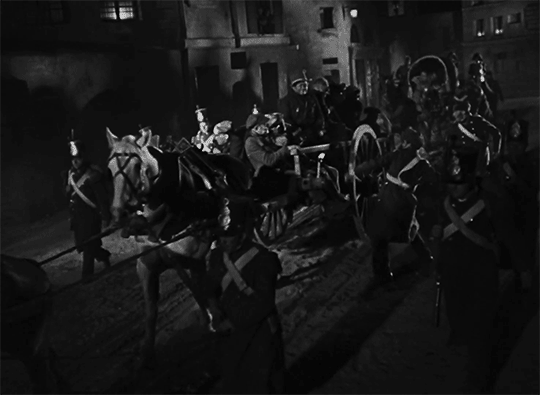
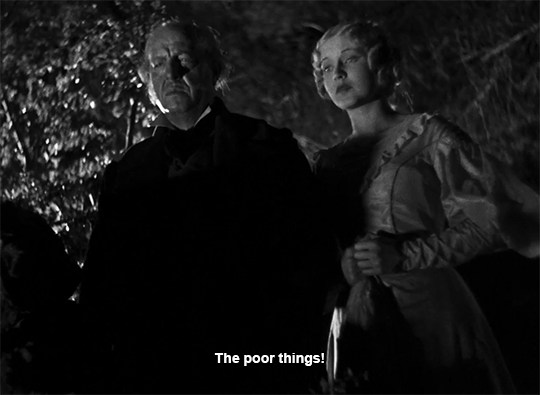
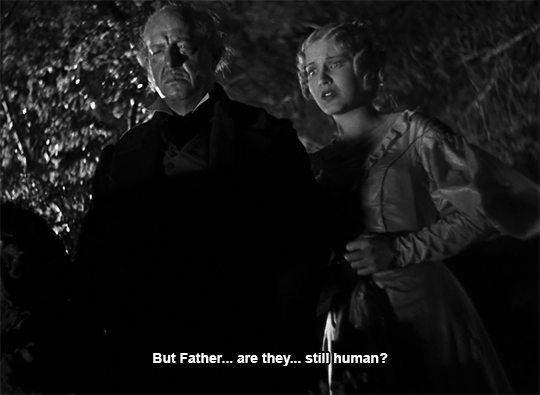

LES MIS LETTERS IN ADAPTATION - The Chain-Gang, LM 4.3.8 (Les Miserables 1934)
At that moment, the cudgelling, multiplied by a hundred hands, became zealous, blows with the flat of the sword were mingled with it, it was a perfect storm of whips and clubs; the convicts bent before it, a hideous obedience was evoked by the torture, and all held their peace, darting glances like chained wolves.
Cosette trembled in every limb; she resumed:—
“Father, are they still men?”
“Sometimes,” answered the unhappy man.
88 notes
·
View notes
Text
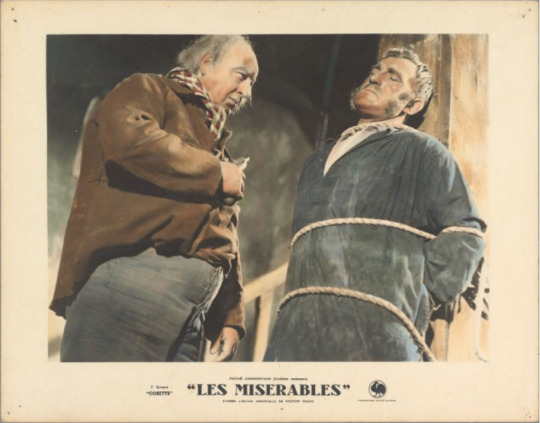



Colorized film stills and promotional pictures for Les Misérables (1934) released by Pathé.
25 notes
·
View notes
Text

doodle found in my high school papers and which still rings true
82 notes
·
View notes
Text
The Daily Tribune, Terre Haute, Vigo County, 7 March 1918

Before the end of the world war, thousands of Americans will have seen Paris—the Paris of Victor Hugo, for there have been no great changes in the sections which he so eloquently describes in his marvelous works.
I'm sorry but that is just not true! That Paris had changed dramatically is like, the whole point of why Hugo was writing about it. Anyways....
But to see Victor Hugo's Paris without braving the dangers of German U-boats, it is only necessary to visit the American today, Friday or Saturday. "Les Miserables," pronounced "Law Miserawl" by some of the scholars of my acquaintance, has been given a fine film production by William Fox, I am told.
American's can't pronounce Les Miserables? Some things never change. In a different edition, a writer in this paper wrote that didn't matter if you called it 'Less Miserables than Usual," or 'Law Miseraub."
10 notes
·
View notes
Photo

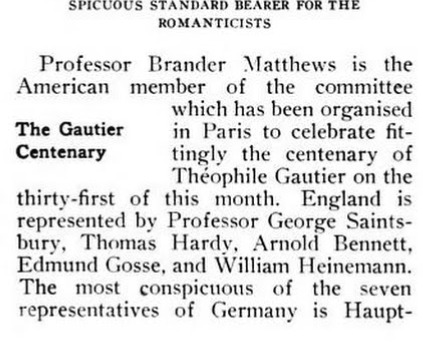
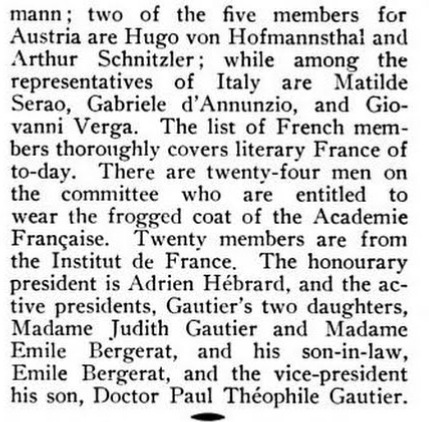

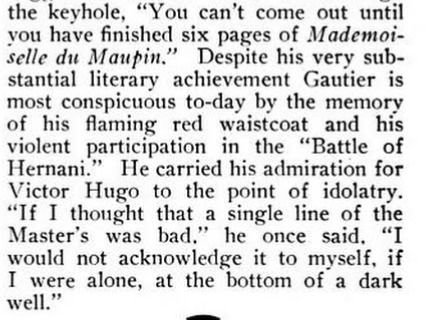
A little article on Gautier from “The Bookman” an old journal. (reblogging because I had missed a very important bit of the article, about his mom and sisters Conspiring to MAKE HIM DO HIS WRITING XD)
33 notes
·
View notes
Text

So people even cried over the 1935 movie, hmm?
40 notes
·
View notes
Photo

When this sum was spent, the Thenardiers began to look on the little girl as a child they sheltered for charity and treated her accordingly. Her clothes being gone, they dressed her in the castoff skirts and blouses of the little Thenardiers – that is, in rags. They fed her on everyone’s leftovers, a little better than the dog but a little worse than the cat. The dog and cat were her messmates. Cosette ate with them under the table off a wooden dish like theirs.
5 notes
·
View notes
Text



So "this woman," Sophie Lyons, was a famous pickpocket who retired from crime, wrote a memoir called Why Crime Does Not Pay, and offered rent-free housing to reformed criminals. She donated land worth $35,000 to create a building for juvenile delinquents. Which is very Jean Valjean in my opinion and yet the fools at the Times Daily Magazine have the nerve to say that "the ultimate defiance is offering a big gift to municipal philanthropy"??
16 notes
·
View notes
Text
From an American review of Raymond Bernard's Les Miserables (1934)
Naturally, there must be large omissions, obvious even to someone who, like myself, has not read the book. For instance, the transformation of Jean Valjean, the brutalized convict, into M. Madeleine, the generous, wealthy and respected Mayor of Montreuil, has to be taken for granted.
Sir, would you believe me if I told you that that is more or less passed over in the book as well?
61 notes
·
View notes
Text

Houghton College, 1989
4 notes
·
View notes

